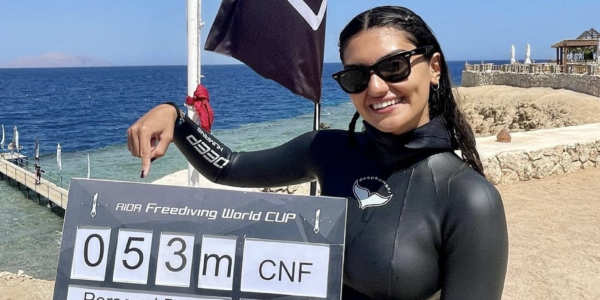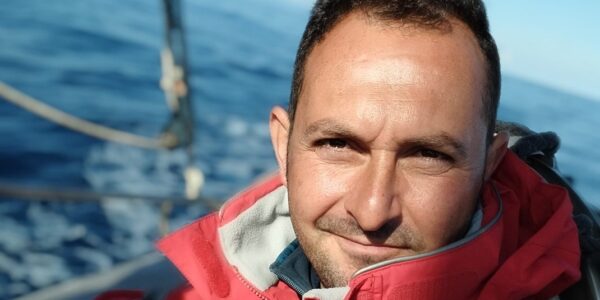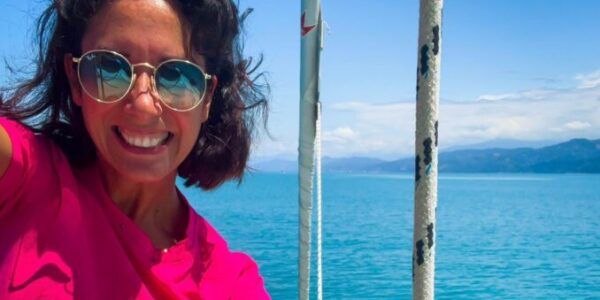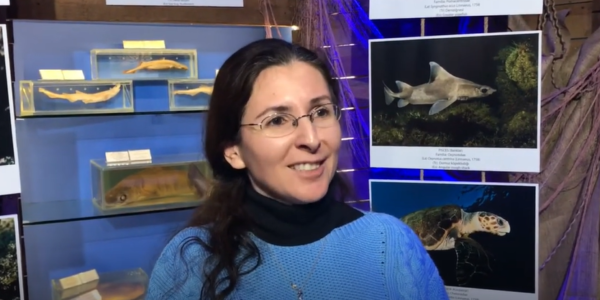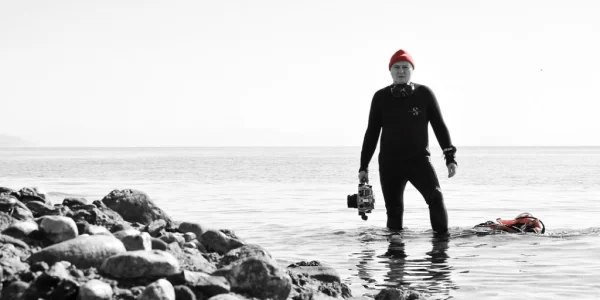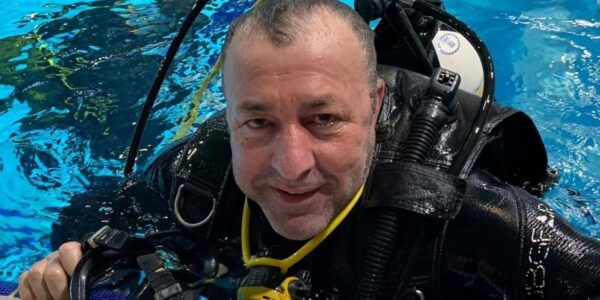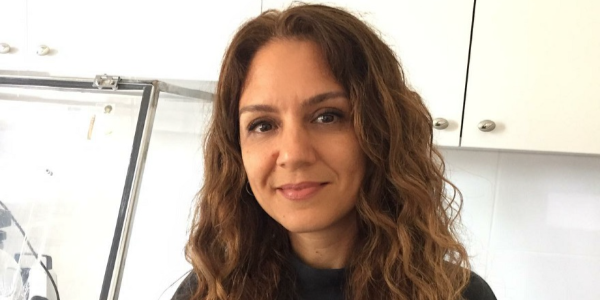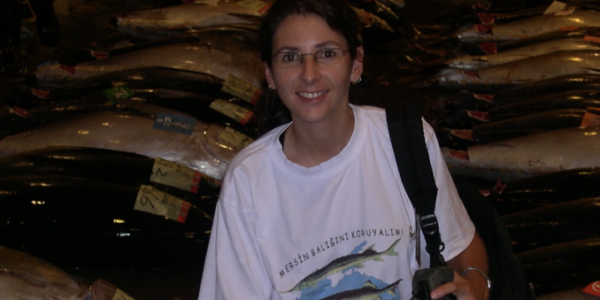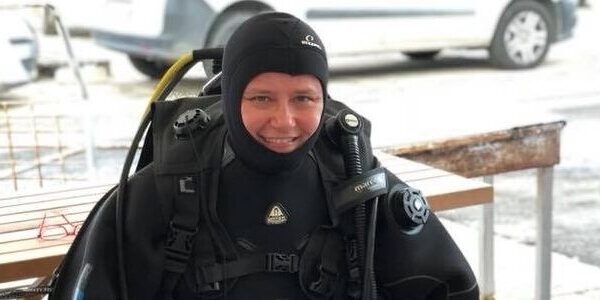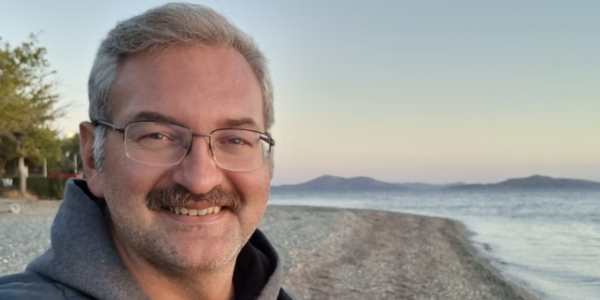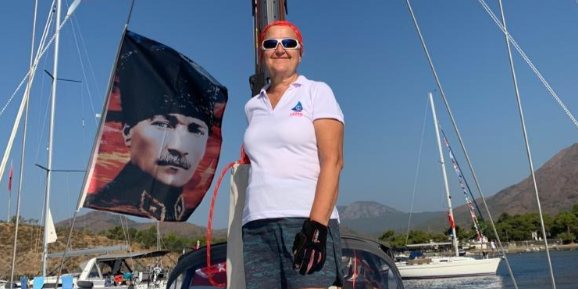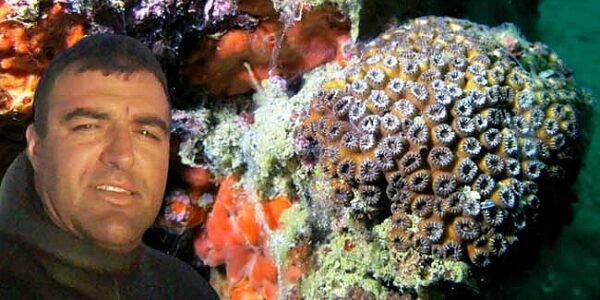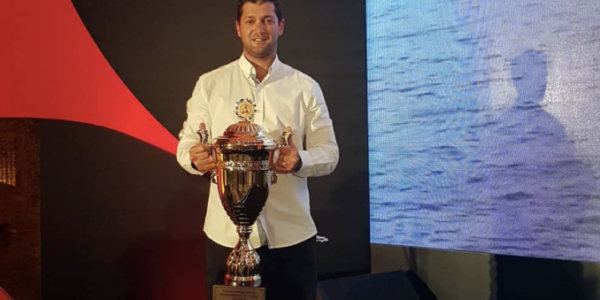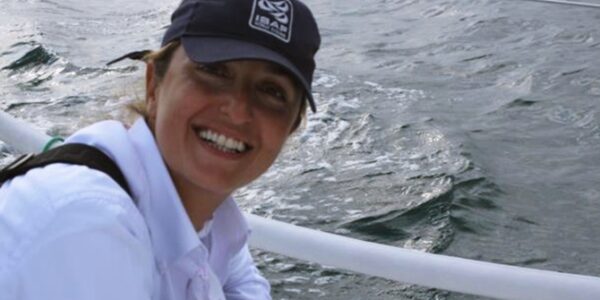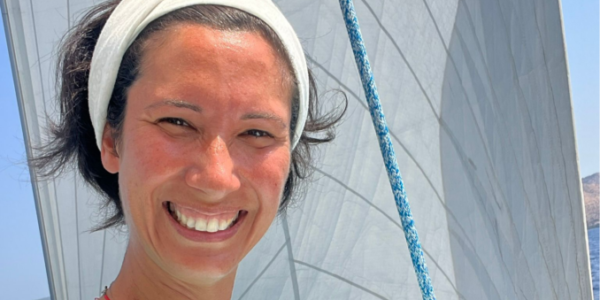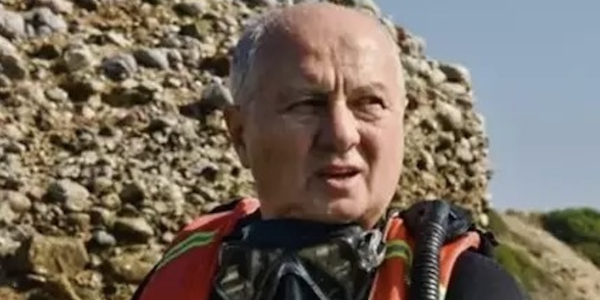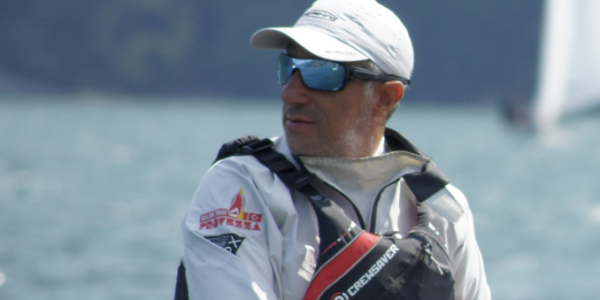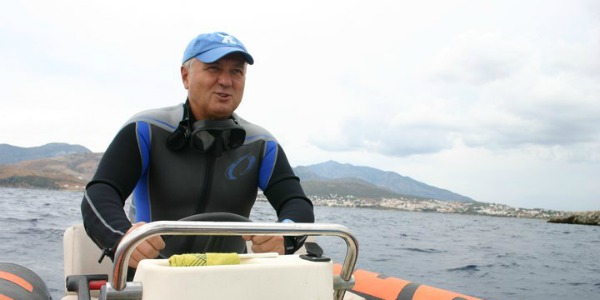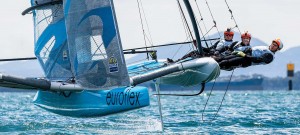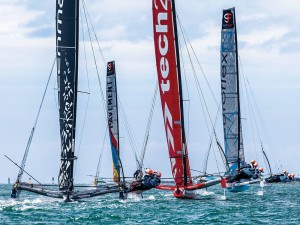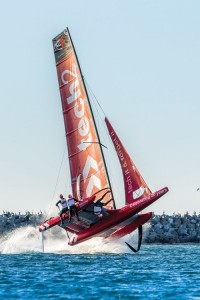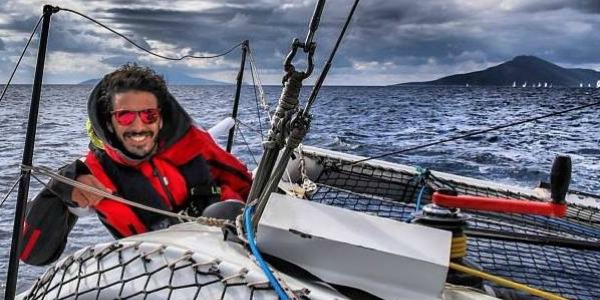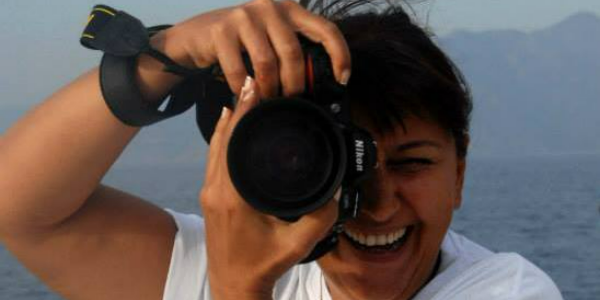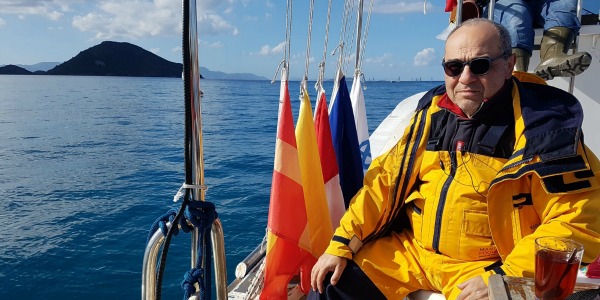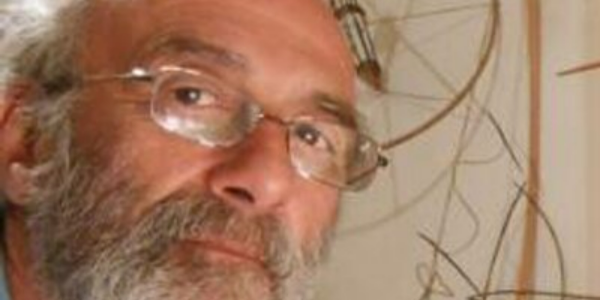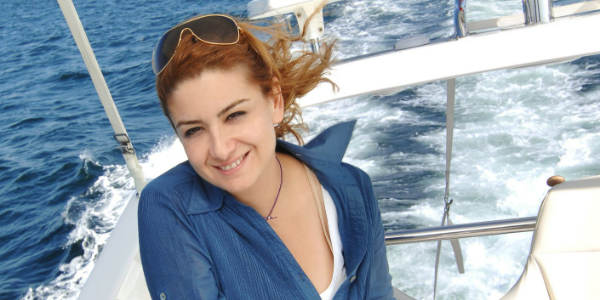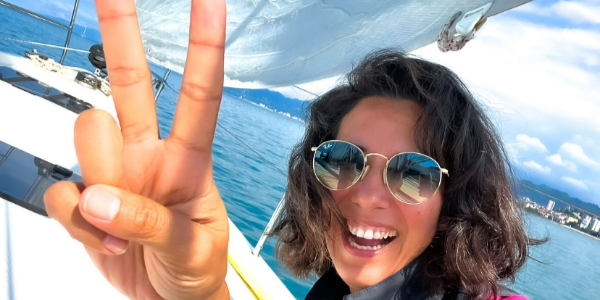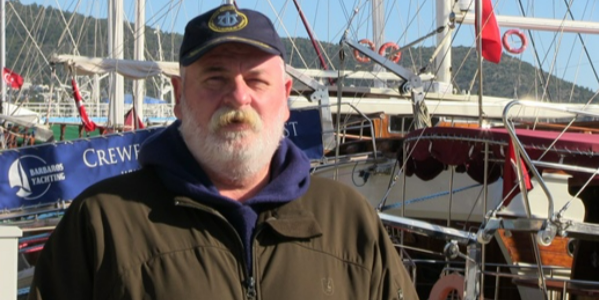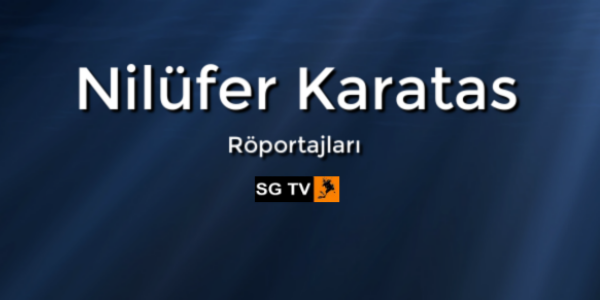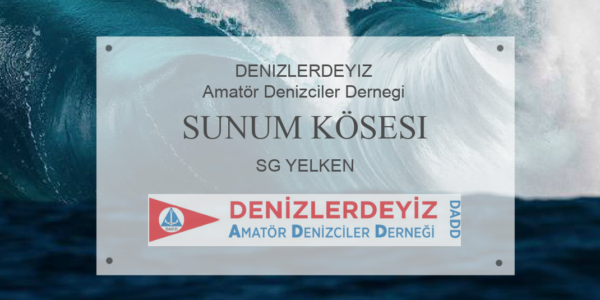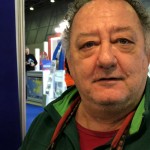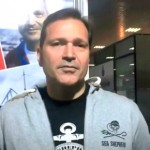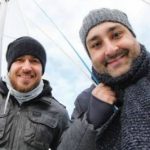I’m teetering on the edge of control, suspended on a trapeze wire, uncertain what will happen next. Every micro adjustment I make of the slippery carbon cylinder in my hand is a flirt with danger. The high-frequency vibrations of the foils slicing through the waterline buzz like a pestering mosquito, and their escalating pitch foreshadows something sinister.
My buddy Iain Jensen, “Goobs,” slips as he scurries and scrambles on the bow. Working with furious efficiency, he drops the carbon foil perfectly like a butcher wields a cleaver, deliberately, calmly, efficiently. Not bad for us first-timers.
The foil grabs hold of the water passing, in a blur, beneath the flexing SuperFoiler. Goobs seems to be trembling ever so slightly as he vaults back toward the wire. It could be his nerves, or simply the tremendous loads building beneath this skittish carbon monster.
We are clocking now, easily romping along at more than 27 knots. It is the fastest I’ve ever sailed on a trapeze wire and foiling. My senses are being bombarded, but at the same time, it’s mesmerizing.
Snapping me back to the job at hand, I hear Glenn Ashby, “Glenny,” chirping away, laughing and wheezing as he hauls the sheets. He’s encouraging me to continue. “Send it, fella,” he repeats aloud, barely audible over the hiss of carbon foils shearing the water. At these top speeds, any flinch on the sensitive tiller will be catastrophic.
The wind whistles, the boat screams, and it only gets louder as we build more speed, the noise escalating to a crescendo as we surge onward toward the gates of Sydney, Australia’s Harbor Heads.
In a beat, cymbals crash, and there’s an unnerving microsecond of silence. Bugger. I’ve dug it in. The center pod’s bow torpedoes through the surface, sending a wall of water to smash me and Glenny. Goobs is spared the sledgehammer of water. Instead, he is hurtling skyward, his last curse words lingering behind him.
I track his orbit; he clears the mast. Phew. He’s not out of harm’s way though. Here he comes, careering back toward the SuperFoiler like a rag doll lashed to a tetherball. He’s done a 180-degree sweep of the bow and barely misses impacting the starboard float on his return. My relief is fleeting. He lands against the mainsail with a shuddering thud, and as we begin to turtle, I take the look on his face to be either a reassuring smile or a desperate look of pain.
The calm and reliable voice of America’s Cup veteran Tyson Lamond comes across the comms. I can’t see him yet, but I know our chase boat is close. He asks if we are OK. I hear laughing from Glenn and an “all clear” from Goobs. I disconnect my trapeze line and splash into the water. We all scramble into the RIB to collect ourselves, and the analysis begins even before the SuperFoiler is pulled upright. We will be out again immediately, but not before a more complete postmortem.
Breakthrough in Adelaide
There’s a genuine buzz around the boat park in Adelaide, Australia, an area the organizers call the “launch pad.” It’s the first event of the 2018 SuperFoiler series where I catch up with many familiar faces. The competition is going to be fierce: I spy people I’ve campaigned with and against in the Olympics. There’s Olivia Price, London Olympics silver medalist, who will steer Kleenmaid, and quite a few of my teammates from Artemis in the America’s Cup, namely Luke Parkinson, who is paired with Ayden Menzies aboard tech2 along with Sam Newton, who was a part of Oracle Racing Team’s previous two Cup campaigns.
I’m looking forward to reigniting my battle with Paul Campbell-James, who is spearheading a team aboard iD Intranet, alongside another Land Rover BAR America’s Cup alumni, Ed Powys. I give the boys a tough time about the color of their SuperFoiler. “Is it watermelon?” I ask, giving a jab about the most delicately colored of all six SuperFoilers, which is rich given mine is powder blue.
I get no response, but they toss back a comment about Euroflex being the “dream team,” a label a journalist used after our crew was announced before the season start.
While the rivalries are friendly for now, I have no doubt it’s tinged with hostility, with sailors from America, New Zealand, Scotland and England, as well as a heap from Australia, everyone is here to win, and egos and reputations are on the line. I certainly intend to race to win, but the chance to sail on home shores alongside good friends, with my wife and family watching, makes it even sweeter. It eases the pressure at least.
An injury to one of the sailors before the first regatta in Adelaide, as well as some interesting boat failures across the fleet, creates an atmosphere of anxiety around the launch pad on the first day. It’s a nervous start to racing, and nobody wants to be too close to one another’s machines. With only a few days of experience in the boat, I don’t think any skipper wants to push it unnecessarily. I certainly don’t.
We nail the pin end of the start and take it from there, managing to connect the narrow course perfectly, even mingling through the spectator fleet in a quest to sail the shortest distance to the mark.
We are also the first to experiment with four-point foiling (having both foils down in the water). It’s a little more stable, and probably slower, through the turn, but it certainly makes our foil jibes easier. While it proves to be a master stroke, it also helps reserve Goobs’ energy, sparing him from dropping and raising two foil boards during every maneuver.
We claim the first race win of the SuperFoiler circuit and then go on to enjoy a clean sweep with seven wins. Everyone says we make it look easy, but we are absolutely gassed. There is a lot of “rope pulling,” as Glenny calls it, and poor Goobs is absolutely smoked from the physical demands of deploying the boards.
We find it so physically draining that we experiment with our positions the following weekend. Even I have a tinker as forward hand before we decide it’s best to stick to our roles from then on. The next task is reviewing all the video footage from the broadcast to see what other experiments the five other teams have come up with. There’s plenty to learn yet.
Check In, Check Out
It seems other teams are a little more forensic with their video studies than we are, with Pavement’s eagle-eyed Steve Thomas closing the gap rapidly on us at the next event in Geelong. While we are lucky to escape with a clean sweep at Glenn’s home regatta, we’re looking more vulnerable with every passing race. The squad on tech2 is now comfortable enough to jostle for position, sail for overlaps and bring the racing ever closer, float to float. Close enough for me, at least, to high-five their three boys at differing stages of the regatta as we sail past one another.
With the skill level becoming more homogenous, and all the sailors riding more comfortably, three-point foiling becomes the favored mode. SuperFoiler skippers are a lot more aggressive with their steering now, a change that’s plainly obvious during the Gold Coast stop of the tour, where teams are really pushing the three-point foiling.
Gold Coast is where our winning streak comes to a halt. In the first race of Supercharged Sunday, we mess up a pair of jibes and find ourselves buried in the pack. In an effort to regain the lead, we decide to throw caution to the wind, but can’t find a clear lane past Phil Robinson. At one point, we’re approaching him with too much speed. I have to bail out before we cause a serious collision, and the split-second bail sends Goobs flying forward off the boat and Glenny into the mainsail. By the time we collect ourselves and our belongings, our race is done. It’s inevitable, however, that in a fleet this strong, our run would come to an end. At each event, teams are getting incrementally faster and sailing smarter. It’s disappointing to let one event get away from us, but it’s obvious we need to up our game if we want to remain on top, and upright. Time to get back to the wire.
Editor’s note: Outteridge and his teammates on Euroflex went on to win the final event of the SuperFoiler Grand Prix in the final race of the series, earning them the Ben Lexcen Trophy, a Champagne shower, and a year to recover for Season 2.
Source: sailing world
